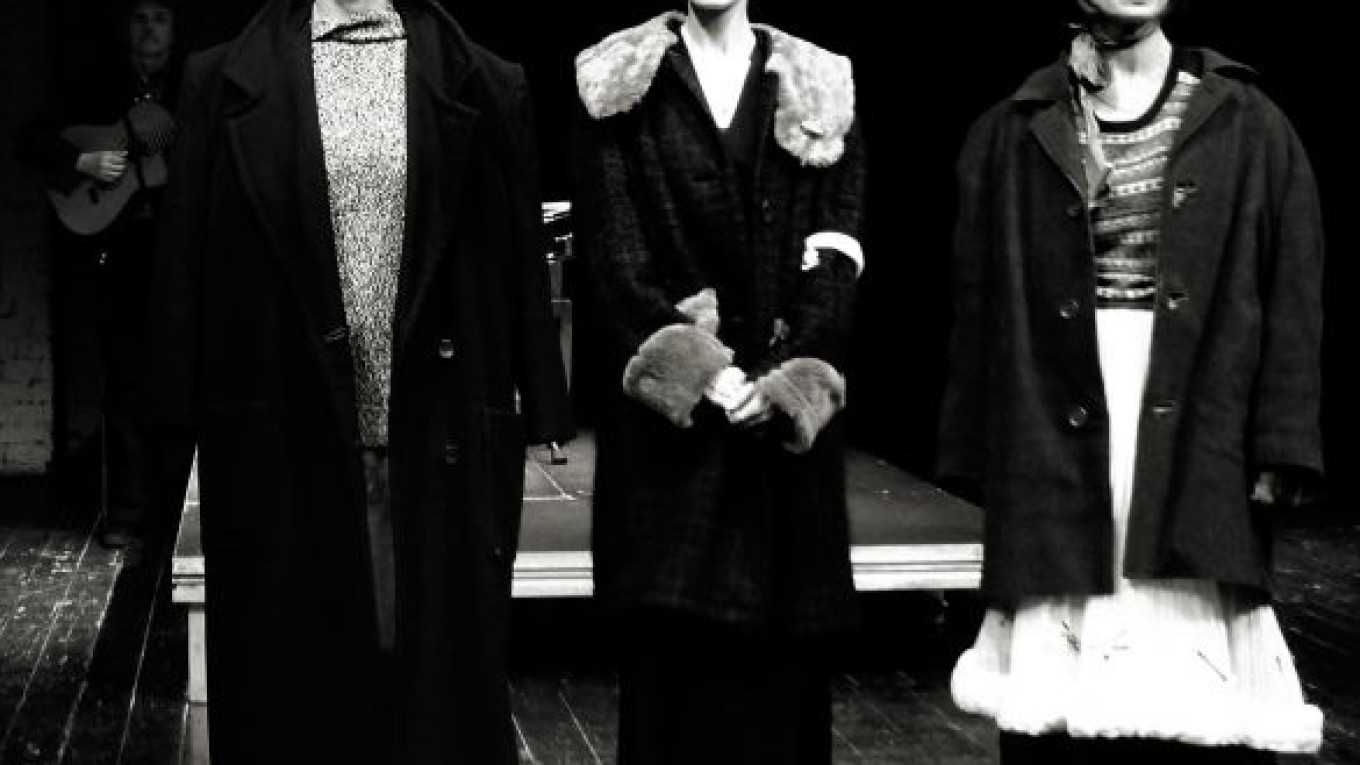Of all the topics I have seen addressed in contemporary plays over the last two decades, I have seen nothing like Tatyana Orlova’s “Occupation Is a Fine Affair. O, Federico!” Semi-autobiographical, it tells the story of what it was like growing up during the Soviet occupation of Germany following World War II.
Of course, it also does much more than that, flipping back and forth in time while liberally mixing in references from various cultures. There are visions from the thawing Soviet Union in the 1950s, the restructuring Soviet Union in the 1980s and, I do believe, from the stagnating Soviet Union in the 1970s.
I reveal my uncertainty for a specific reason — the play flows like a dream, leaping among memories and decades in the blink of an eye. It is impossible to keep a complete grip on what is happening and that is just as it is supposed to be.
Director Yury Pogrebnichko, who over the years has evolved a unique style of minimalist obscurity at the Okolo Theater, clearly found in Orlova’s play a text that suits his manner well. We are told that this play was written 20 years ago and has lain untouched in the author’s desk drawer ever since. It’s an interesting fact, perhaps, but it would be a mistake to make too much of that. The play resonates as vividly and freshly as if it were written yesterday. This is because “Occupation” is not specifically about experiences in postwar Germany, but is rather about how memory shapes our lives.
The play cannot be summarized in any meaningful way.
There is a story about the young girl chastising church-going Germans by shouting at them: “There is no God!” Soldiers, as might be expected, are ever-present — constantly marching in and out of the picture. There are memories of a haircut, about how the Germans hit their children for misbehaving, about girlfriends who grew up to be successful or not, and about how Soviet passengers would not leave the train when it stopped in Warsaw “because the Poles don’t like us” and they would throw stones at the train cars. The girl never understood why this happened. “We love the Poles,” she says.
The girl is no longer a girl, of course. She is a woman of an indistinct age. As played by Lilia Zagorskaya, she is childlike and fragile beneath piles and layers of an old woman’s clothing. She talks about herself as an old woman from time to time, suggesting that she has suffered from schizophrenia and that she has made attempts to take her own life. But there is also something about her that seems indestructible.
Life for this unnamed character is not merely a collection of actual experiences, but is also made of the images and impressions that have come to her through art. The films of Federico Fellini, Akira Kurosawa and Andrzej Wajda, as well as the songs that have come from those films, are important signposts in her consciousness and they return to her mind as if they were as real as any actual event.
Beyond the melange of impressions flowing freely throughout the performance, numerous moments tag the play and its impact directly to the modern world. These are comments that the woman makes apropos of nothing, perhaps to herself, perhaps to an audience that might be watching.
When perestroika came, she recalls, she was thrilled, although she emerged from that era in a damaged and polarized state.
Orlova’s play is heavily populated — there are 11 characters. But none, aside from the main figure, emerges from the fog of memory to acquire recognizable individuality. Dancing soldiers, singing women are figments of the unnamed woman’s imaginative memories.
The set design by Pogrebnichko and Nadezhda Bakhvalova employs small items to suggest mood and place — a red flag on the wall, an SS officer’s jacket hanging on a hook, train car bunks along one wall.
“Occupation” is a show that revels in its obscurity. It also presents an intriguing mosaic of one woman’s story about life in Russia in the second half of the 20th century.
“Occupation Is a Fine Affair. O, Federico!” (Okkupatsia – miloye delo. O, Federiko!) plays Friday, Wednesday at 7 p.m. at Okolo, the Theater Near the Stanislavsky House, located at 9a Voznesensky Pereulok. Metro Pushkinskaya. Tel. 690-2557. . Running time: 1 hour, 45 minutes.
A Message from The Moscow Times:
Dear readers,
We are facing unprecedented challenges. Russia's Prosecutor General's Office has designated The Moscow Times as an "undesirable" organization, criminalizing our work and putting our staff at risk of prosecution. This follows our earlier unjust labeling as a "foreign agent."
These actions are direct attempts to silence independent journalism in Russia. The authorities claim our work "discredits the decisions of the Russian leadership." We see things differently: we strive to provide accurate, unbiased reporting on Russia.
We, the journalists of The Moscow Times, refuse to be silenced. But to continue our work, we need your help.
Your support, no matter how small, makes a world of difference. If you can, please support us monthly starting from just $2. It's quick to set up, and every contribution makes a significant impact.
By supporting The Moscow Times, you're defending open, independent journalism in the face of repression. Thank you for standing with us.
Remind me later.


